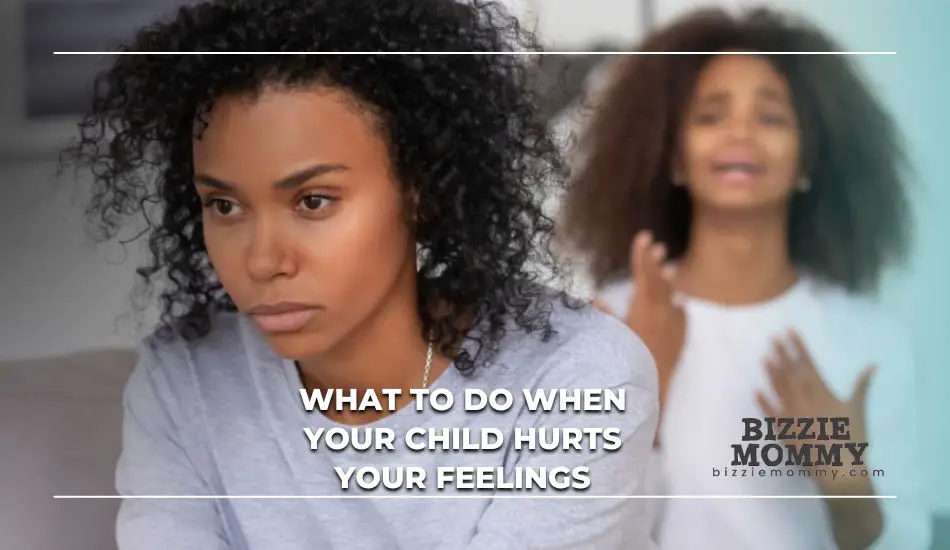Parenting is a joy-filled experience filled with unconditional love and cherished moments. However, sometimes you may feel like this journey brings out challenging times and unexcepted emotional pain, heavy deep breaths, frustration, and hurtful words – these big emotions can be felt when your child hurts your feelings.
While children may not plan to hurt your feelings, their aborning emotions and limited wisdom can sometimes lead to unintentional hurtful behavior. As parents, it is crucial to handle and overcome your own feelings effectively in order to establish a supportive relationship with your adult child.
Remember, It is natural for parents to feel hurt when their child unintentionally hurts their feelings, as they have invested their love and care into the relationship.
Children may say or do something without fully comprehending the impact on their parents’ emotions.
It is essential for parents to express themselves openly, practice self-care, and encourage empathy in both themselves and their kids.
Understanding and discovering constructive ways to handle these moments can contribute to a harmonious parent-child relationship.
Understanding the Dynamics of Parent-Child Relationships
Nurturing the parent-child relationship is the most meaningful metier to establish in life to influence connections in human life. This is the relationship where your child understands the sense of emotional well-being, healthy development, challenging times, and positive aspects, fostering healthy communication, and nurturing emotional growth.
Below are the few aspects that effectively contribute to making your kid emotionally charged human.
Attachment and Bonding:
The pillar of the parent-child relationship is upon attachment and bonding, which is built on constant love from infancy to grown children Kids form comfort, security, and a sense of trust, which is the most important thing for a fully developed child.
Communication Techniques:
Effective communication acts as the heart of a healthy relationship. Parenting style is often developed of the dynamics of communicating styles when your child tends to grow as a person. From nonverbal cues during infancy to complex discussions during adolescence, understanding how to adapt communication strategies is crucial.
Boundaries and Autonomy:
It is important to encourage healthy boundaries and respect children’s feelings and points of view. Recognizing when you need to guide your child, when you have to let them do there, and how to stay calm during their independent choices.
Understanding these dynamics can help parents navigate e challenges, stay on common ground, set boundaries, celebrate milestones, and build a strong, loving bond with their children.
By nurturing open communication and emotional support parents are more likely to battle wisely. And create a foundation for a positive and enduring parent-child relationship even if they have two children.
Unconditional Love and Emotional Investment
Unconditional love and emotional investment form the cornerstone of a nurturing and meaningful parent-child relationship. These factors can foster a strong bond that sustains through challenges, celebrates triumphs, and contributes to a child’s overall well-being.
Unconditional love is a profound and unwavering affection that parents hold for their children, regardless of circumstances or actions, even when a child makes mistakes, faces difficulties, or experiences setbacks.
Let’s delve into the significance of unquestioning love and inspirational investment in the context of parenting:
- Acceptance and Belonging:
Unconditional love corresponds to a child that they are valued for who they are, not just for their achievements or behaviors.
- Positive Self-Image:
Children who share unconditional love, have realized positive self-image and self-esteem. They rise knowing that they are loved for who they are and that is not contingent on certain expectations.
- Emotional Investment:
Being an emotional investment toward your child is the commitment to understanding and responding to a child’s specific emotional needs, helping them overcome hurtful things, and forming clear boundaries and developing essential life skills.
- Active Listening:
Being emotionally invested even when your grown child hurts your feelings also means actively listening to a child’s thoughts, troubles, and emotions. This practice fosters open communication and lets children know that their feelings are valued.
The Impact: Unconditional love and passionate investment make a nurturing environment that supports a child’s emotional, social, and cognitive growth. These characteristics lay the foundation for healthy relationships and the ability to handle life’s challenges with resilience.
Navigating children hurt feelings with compassion is a profound skill for most parents that strengthens relationships, and fosters emotional growth.

Overcoming hurtful feelings and showing empathy and kindness promote understanding in both parent-child interactions.
Navigating hurt feelings with compassion leads to productive conversations and deeper connections.
Here’s a guide on how to navigate hurt feelings with compassion:
- Validate feelings because validation shows that emotions are significant for well-being.
- Ensure the discussion takes place in a calm or private environment. Allow your child to express without fear of judgment or interruption.
- Share your feelings using “I” statements, which express your emotions without blaming or accusing. For instance, say, “I felt hurt when you said that,” instead of “You hurt me when you said that.”
- Taking responsibility if you acknowledge your acts contributed to the hurt feelings of your kids helps reconstruct trust.
- Demonstrate how to express feelings, apologize, and work together toward a resolution.
Validating Emotions for Both Parents and Children
To navigate feelings with compassion, validating emotions is a crucial practice as well. This benefits both the parent and the child to acknowledge their emotions and respect each other in any situation and encourages a safe environment to feel valued.
Here’s a guide on how to effectively validate emotions for both parents and children:
For Parents:
Self-Awareness:
- Start by acknowledging and accepting your own emotions before understanding your child’s.
- Keep in mind that it’s normal to experience feelings, and permit yourself to feel.
Active Listening:
- Always be attentive when your children try to express their emotions act as a listening ear and be fully engaged by maintaining eye contact.
Validation Statements:
- Always have a conversation using a few validation phrases such as:
- “I can understand why is this making you sad.”
- “It’s okay if you feel angry/sad/frustrated sometimes.”
- “I respect your meaningful decisions .”
For Children:
Label Emotions:
- Help your child to label and express their emotions.
- Teach them what different feelings are and how different they feel and help them identify them.
Share Openly:
- Always let your child fully express and talk about their emotions.
- Create a safe place for them and the comfort of being listened to over criticism.
Seek Support:
- If you witness your child’s feelings upset constantly, teach them to seek support from people they feel loved by such as friends, teachers, or counselors.
Validating emotions practice promotes emotional intellect, strengthens relationships, and equips children to navigate their feelings throughout their lives.
Strengthening the Parent-Child Bond
Promoting a strong parent-child bond is important for healthy emotional development and overall well-being. As a mother always try to express your love consistently without any judgment.
The quality of a good mom is letting your child know that you are affectionate regardless of difficult circumstances and always being ready to spend time together engaging in activities that you both enjoy to create everlasting memorable experiences.
Being fully present while communicating with your child and showing genuine interest in their thoughts and feelings provides them with attention.
Hugs and physical touch while communicating express a sense of warmth and security between you and your child. Accept and celebrate your child’s achievements, no matter how small. Your constant support and pride boost their self-esteem.
Building Trust and Understanding:
As parents, the only thing that matters while strengthening your bond with your little ones is your unquestioning trust, which requires consistent effort and open communication.
Here’s how you can build a strong child-parent relationship with corresponding trust:
- Try to be constant with your actions and words. Trustworthiness helps your child develop a sense of security and trust.
- Always encourage truth even if the truth is difficult. Honesty supports the idea that they can rely on what you are telling them as the truth.
- Always respect your child’s perspective and personal space. Guiding them that you value their boundaries promotes a sense of safety.
- Not only just make promises but also fulfill promises you make to your child. This confirms your commitment to them.
- If you know you made a mistake always be ready to apologize. Remember you are your child’s role model and teaching accountability.
Teaching Emotional Awareness and Expression:
Having an emotionally intellectual child is a blessing. Emotional intellect is a critical life skill that sweetens relationships and well-being.
Here’s how to help your child develop emotional awareness and expression:
- Teach your child to differentiate between emotions and intellectually name them while expressing or discussing.
- Now that your child knows what are different feelings, encourage them to talk about them. Show respect for both positive and negative emotions.
- Avoid dismissing or criticizing their feelings. Let them know their feelings are valued.
- Encourage and help your child to find constructive ways and strategies to manage and cope with their emotions.
Engaging in Meaningful Quality Time:
Spending quality time together is another crucial aspect that strengthens your connection and makes special memories.
Here’s how to make the most of your time:
- Always plan your day to spend time with your kid without distractions. This portrays a sense of genuine connection and happy interaction.
- Try to be engaged in activities your child loves to play and let them teach you.
- Ask open-ended questions and actively listen to your child’s own lives healthy ways, thoughts, and ideas.
- Establish family traditions to spend time with other family members. These traditions become anchors of your relationship.
- Exploring the world as a duo strengthens your bond.
In Summary
Navigating the complex type of hurt feelings within a parent-child relationship requires patience, kindness, and effective communication. Despite the challenges, the bond between parent and child can be enabled and strengthened through understanding, validation, and shared experiences. By developing emotional awareness, showing unconditional love, and promoting open dialogue, both parents and children can grow together, creating a resilient and enduring connection that stands the test of time.

